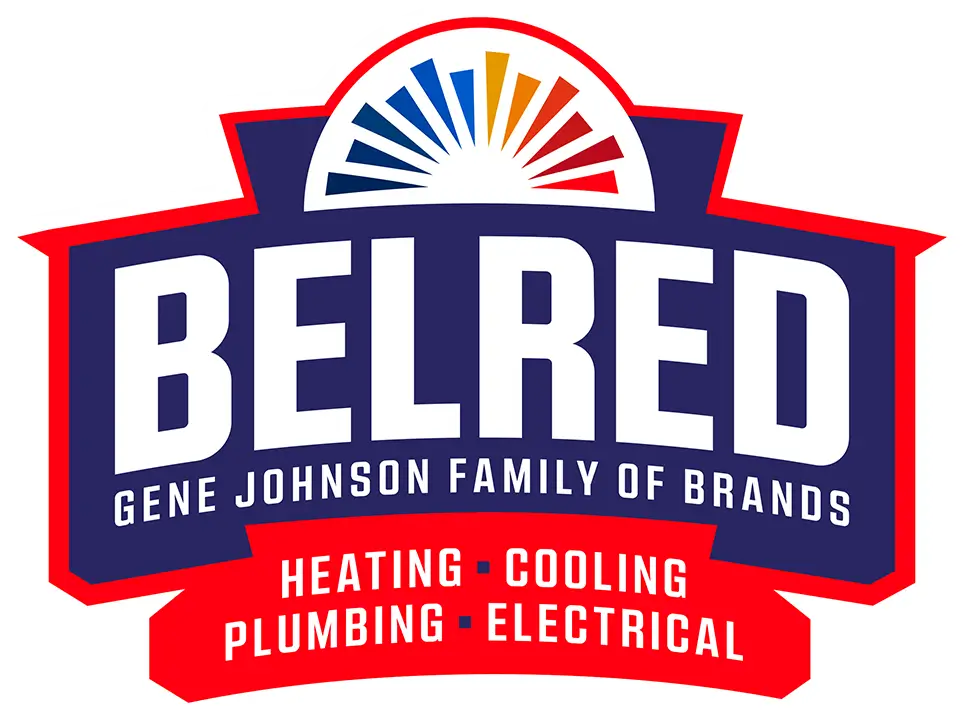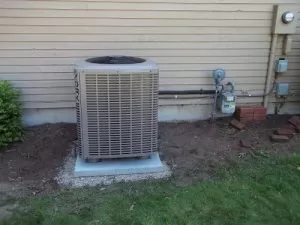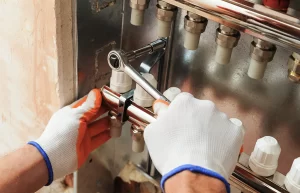A ground source heat pump is an innovative heating system. Its unique integrations are more sustainable and reliable.
Ground source heat pumps, also known as geothermal pumps, might help owners save more than a few bucks monthly. You may be pleasantly surprised by how much these heat pumps help you cut back on monthly dues.
A ground source heat pump may be harder to spot if you don’t know what you are looking for. Geothermal systems have indoor units linked to outdoor coils underground or underwater.
Read on to find out more about a ground source heat pump.
What Are Ground Source Heat Pumps?
Geothermal heat pumps are a newer type of Heating, Ventilation, and Air Conditioning (HVAC) system. They facilitate heat in and out of enclosed spaces to alter temperatures.
A ground source heat pump derives heat particles from ground water. Heat pumps may then inject heat indoors according to your thermostat settings.
Indoor handlers don’t only deliver heat using closed-loop systems. They can also transfer heat out of structures, storing them for winter.
Residential systems are already sophisticated, but there are much larger alternatives for commercial buildings.
A geothermal heat pump can cool buildings much higher and wider than your family home. A geothermal heat pump with vertical systems can even heat skyscrapers.
Whether cooling towers or houses, geothermal systems are the most sustainable and sophisticated heating mechanism. A ground source heat pump facilitates geothermal heat through ground loops buried outdoors.
Before thinking twice about digging up your yard, installing a ground loop is the more sustainable alternative against typical HVAC systems. You may enjoy guiltless hot water and ambient heating thanks to geothermal systems.
What Do Geothermal Heat Pumps Do?
Like bears before winter, ground source heat pumps collect and store resources for later use. Thanks to its stockpiling method, homeowners don’t have a heating system struggling to generate heat against subzero temperatures.
Various integrations set the Geothermal heat pump apart, making it the most cost-effective yet stable heating device. Tapping into stored resources helps make the geothermal heat pump more reliable and affordable than other HVAC systems.
Its innovative strategy ensures little to no wasted resources while remaining versatile enough for heating and cooling seasons. Thanks to its innovations, a ground source heat pump may come at higher costs.
How Much Does a Geothermal Heat Pump Cost?
Its overall operational costs are more sustainable for both users and the environment. However, some may flinch at upfront prices.
The benefits of Geothermal heating come with added costs. A ground source heat pump may cost nearly forty percent (40%) more than an average HVAC system.
Still, its innovation may outweigh other HVAC systems in and out of its price range.
Are There Different Kinds of Heat Pumps?
The intricate configuration of a ground source heat pump may be more challenging to install. While ground-source heat pumps are the most environmentally friendly, there are other kinds.
Some heat pumps have simpler heat extraction systems, requiring lesser installation costs. However, the sustainability of a Geothermal heat pump can’t be outdone.
Ground Source Heat Pump
The three major parts of all heat pumps are:
- Heat Exchanger
- Distribution System
- Heat Pump
The heat exchanger lies outside your home, buried underground (on dry land or within a body of water), and absorbs heat from the earth’s surface. Technically, the heat energy is derived from underground moisture.
The heat pump mechanism links the outdoor heat exchanger to your home’s indoor distribution system through closed-loop systems.
The heat exchanger transmits thermal energy according to your preferred temperature. Unlike any other heating system or air conditioning unit, a geothermal heat pump stores excess heat.
Air Source Heat Pump
An air-to-air source heat pump is the most common type in America. One unit outdoors is linked to one or a few indoors.
Air source heat pumps have an outdoor coil that absorbs heat outdoors to alter the indoor air temperature. The heat exchanger is found within the outdoor unit, taking up less space heating your home. Like all heat pumps, it doesn’t generate heat through combustion.
Air source heat pumps are more compact and come with lower installation costs. Unlike conventional heating systems, an air source heat pump doesn’t require ductwork. It is more affordable, sustainable, and reliable than central air conditioners.
Still, without storage functions, it dispels heat outward. It may struggle just as much as other heating and cooling systems against erratic temperatures and extreme weather conditions.
Water Heating System
A heat pump doesn’t only deliver ambient air heating. A water heating system may have a heat pump mechanism to create the same open-loop systems as other heat pumps.
Like a natural gas water heater, a geothermal heat pump delivers hot water through direct exchange systems for plumbing and indirectly for your home heating needs.
A water heating device is typically linked to underfloor heating coils. The coils within your floorboards radiate heat for space heating, less likely to be influenced by external temperatures penetrating your indoor environment.
A closed-loop system may use hot water for heating floors instead of heat-radiating coils. It can sustain temperatures longer, delivering longer-lasting heat than other devices.
Geothermal Heat Pump Systems (Open- or Closed-Loop Systems)
Ground source heat pumps with closed-loop systems provide efficient heating through more direct exchange systems than those with an open-loop system. Both systems consume less of your home’s local electricity supply, generating low operational costs. While open-loop systems are more eco-friendly than conventional heaters, it still results in some “waste.”
Still, with water being a renewable energy source, an open-loop system doesn’t effectively reuse all its resources by producing wastewater. A closed-loop system produces zero emissions, reusing and recycling all resources, reducing its overall intake.
A closed-loop ground source heat pump works with all renewable energy sources without letting any go to waste. Without any burning elements, the ground source heat pump’s only carbon dioxide emissions come from its electric systems.
The Geothermal Advantage
The ground temperature is a stable heat source, requiring the heat pump to consume less energy to sustain or alter temperatures.
Unlike ambient temperature, underground temperatures are less likely to be influenced by ambient air. Subzero temperatures will take a while to infiltrate the ground loop and longer influence ground temperature.
Earth maintains heat energy longer, with only the earth’s surface susceptible to erratic temperatures.
A ground heat exchanger is buried over 50 meters underground, too far for weather conditions to reach, making ground water a more stable heat source than the air temperature.
The less your heat pump struggles to facilitate heat particles, the easier heating and cooling your home is, leading to much lower energy prices.
A furnace burns various resources to generate heat and doesn’t rely on outdoor temperatures. Still, even a high-efficiency furnace requires abundant electrical flow, with systems needing more electricity generation to manage emissions and temperatures.
Ground loops help give your home peak heating efficiency resulting in more energy savings.
Are there any Cons to Geothermal Systems?
A ground source heat pump sounds great now. If you are excited to install one today, take your foot off the gas for a second.
Geothermal heat pumps require meticulous installation and maintenance. Installation costs may differ on how much space your ground source heat pumps need. The larger the structure, the more ground loops Geothermal heat pumps may require.
Additionally, Geothermal heat pumps have sophisticated systems with various components. Ground-source heat pumps may be less reliable and more costly without precise installation using proper tools and techniques.
Like every other appliance, especially air handlers, routine maintenance and tune-ups keep systems working properly.
Maintaining Your Heat Pump Systems
Ground source heat pumps are sustainable, but their more sophisticated systems require more care. Poorly maintained Geothermal heat pumps can be just as inefficient and hazardous as a natural gas furnace.
You wouldn’t leave a natural gas burner burning all day and night without keeping a close eye on its various components. A routine inspection helps you monitor typical wear and tear, remedying minor concerns before they cause significant damage.
Yearly maintenance is advisable for all heating and cooling systems.
Should I Call an HVAC Specialist?
Taking preventive measures helps your HVAC systems last longer. Cleaning your furnace is one thing, but repairing or replacing critical components is different.
It would be best if you enlisted professionals with particular expertise to conduct proper maintenance and tune-ups. Since HVAC systems are used most to defend your home against extreme weather conditions, scheduling a pre-season maintenance inspection a month before summer or winter is best.
Timely and professional HVAC services keep your systems stable and efficient all year.
BelRed
You don’t have to go through things alone. If you need heat pump repair and furnace services in Washington, the BelRed team is there.
Don’t trust amateurs with quick fixes at “too good to be true” prices. Our team of specialists will ensure your home gets quality and cost-effective services you can only get with BelRed.
We find solutions for every problem. Call in with your concerns now.







